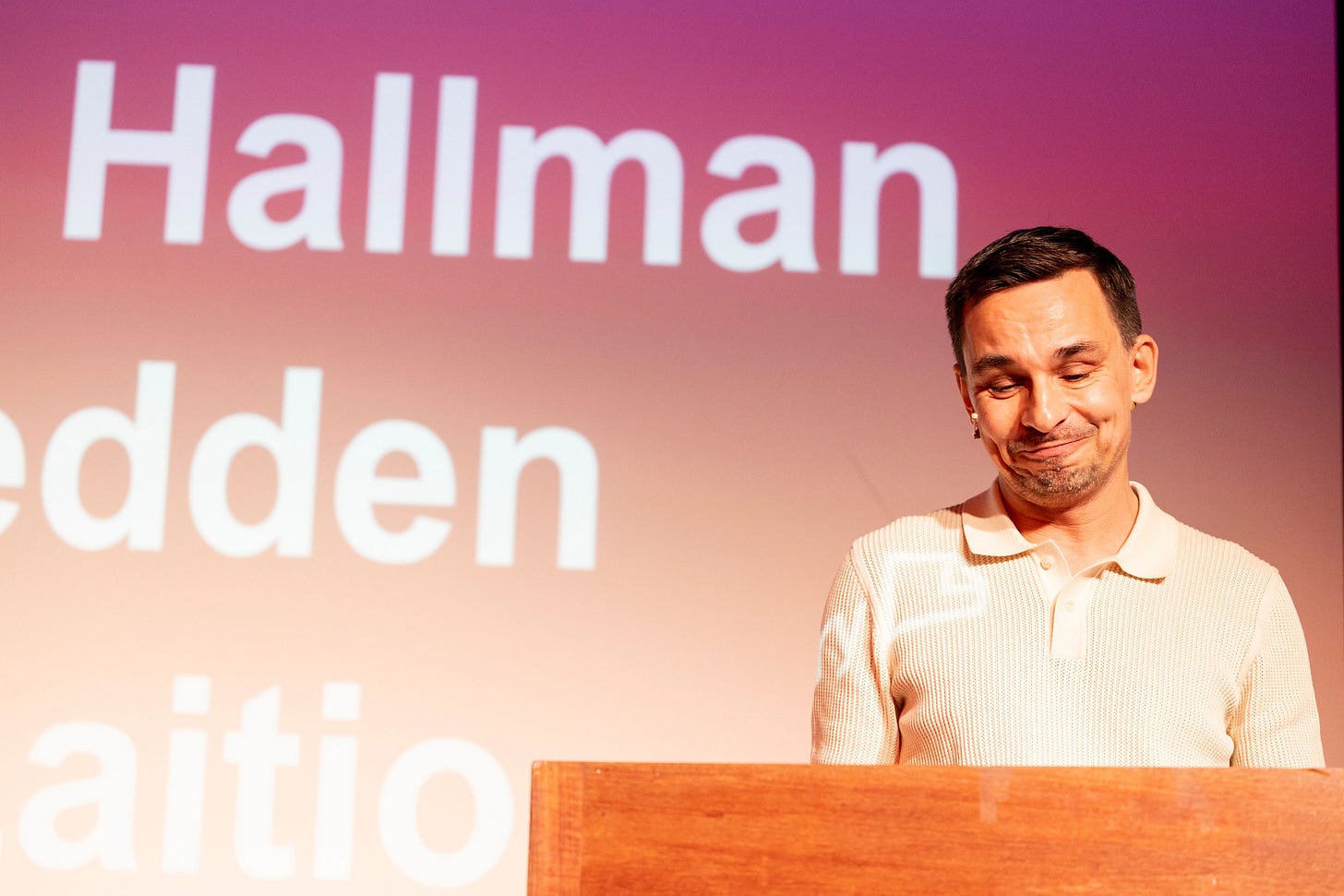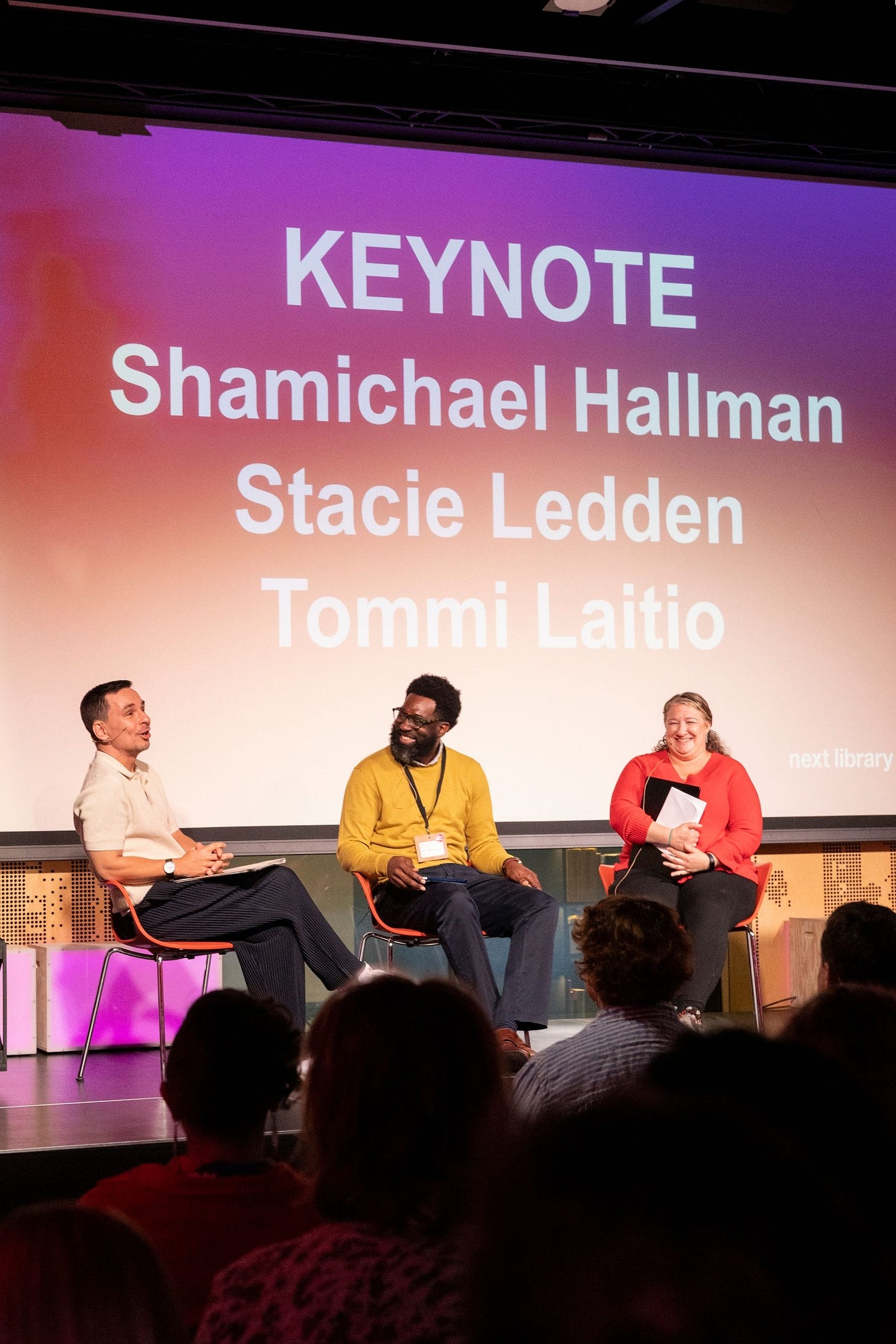Why Do I Show Up?
My talk at Next Library festival on how growing up gay has profoundly impacted how I look at institutions and why my starting point is friction.
This talk, given at the Next Library conference in Aarhus, Denmark on Tuesday 27 May on the reasons for my commitment to public life, was the most personal I have delivered. You can hear it in my voice on the video below. Even after dozens of rehearsals, the emotional wave surprised me in the moment.
I am deeply grateful to my co-leads Shamichael Hallman and Stacie Ledden for the opportunity to try out the concept of a Civic Saturday together in our session. Civic Saturday is a denominational, civic analogue to a faith gathering, with music and sermon developed by Citizen University. We each delivered a 7-minute sermon on our reasons for showing up. It was Shamichael who brought us to this question of showing up. It unlocked something in me.
I am thankful to the Next Library community for the support in this moment of vulnerability.
Why Do I Keep Showing Up?
By Tommi Laitio
Good morning.
I grew up in a small town just north of here, in Finland, in a town called Nummela. My home was two blocks from the library, which was this low-ceilinged building in need of renovation. But it did make me a different person.
As a teenager, I realized that I was not quite like the other boys. I used to go to the library, take the magazine of the Finnish gay rights organization, put it inside a political weekly and read it in a corner, constantly surveying the room to make sure that a classmate - or a librarian - would not catch me in the act.
I needed those private moments. When I was a teenager, gays on TV were absent, tragic, perverts or ridiculed. It took until I was a 22-year-old university student when Finland finally decriminalized the promotion of homosexuality, or as the law was called, “public incitement to fornication with a person of the same sex”. I got the right to marry the person I love at the age of 38.
I share this with the hope that you understand that most of my life, institutions haven’t fully been on my side.
Those experiences have profoundly impacted the way I look at public life, institutions and democracy. I am convinced that it does not take much for my rights to be up for renegotiation. As my friend Jason put it:”Growing up gay requires you to dare to live your life while always having your bags packed.”
I am not alone with experiences of not being seen, misunderstood or mistreated by public institutions. For me it was due to sexual orientation but for others it might be due to age, illness, loneliness or the lack of a college degree. It might be for being a devout Christian in a secular environment or a young woman on a construction site. It might be for being exhausted after having slept in a parking garage last night. It might be for pretending to have forgotten your reading glasses to hide the inability to read. Or it might be for being great at your job but not really knowing how to play with your toddler. We seldom know what other people carry with them to public life but we carry the consequences together. As the great philosopher RuPaul says:”We are all doing drag.”
I believe that the foundations of democracy are built in regular, positive to neutral experiences with those different from us. Moments like helping someone with a stuck printer, checking if the man who fell on his bike hurt himself, providing instructions to the train station to a tourist, greeting a stranger in an elevator, asking if someone’s OK after being harassed on the metro or even an occasional flirt are all investments in democracy. Without frequent experiences of recognition and spontaneous care we lose hope in the noble idea of democracy. Whether you are a Adventist or an atheist, an investment banker or a janitor, in your first or your eighth decade, if I don’t share space with you regularly, we both, and we all, lose.
Bringing all these uses, values and users into limited spaces is not easy. We people are as capable for kindness as we are for disrespect and hate. This is why my starting point to public life is friction rather than belonging. I want us to be less naive about what living together looks like and far more creative and practical in what we could experience together.
The best way I have found to describe this aspiration is the Spanish word convivencia, meaning coexistence. Convivencia is a state between harmony and conflict, which can easily flip to either direction. It´s like a good dance party or dinner with your larger family. It’s like gardening in the sense that it takes will, skills, weeding and fertilization, to live with others. It’s caring for each other and experiencing joy while often stepping on each other’s toes and annoying the hell out of each other.
I emphasize friction as I encourage us to start from difference rather than from an often naive idea of community. One community is always achieved at the cost of excluding some people.
When we are successful in public life, we experience struggles as well as moments of being part of something greater than ourselves. I want libraries to be truly public spaces where you do not need my validation or approval and I do not need yours.
I show up to develop public spaces where you can explore your interests and know that while things might at times be unpredictable and other people might force you to alter your plans, there are people who can help out. That you’ll be OK.
The best way I have seen this sentiment captured is in the main staircase of Helsinki’s Central Library Oodi. Before the library opened, artist Otto Karvonen asked the public who this new library should be dedicated to. He then curated a set of more than 300 identities, which he hand painted on the railings. As you walk up the stairs to book heaven on the third floor, you are reminded that this space is dedicated to uncles, the disappointed, detainees, the guilty, right-wingers, victims of war, Pollyannas, ragamuffins, men, children in foster care, grandchildren, amateurs, skeptics, romantics, sports fans, Afro-Finns and creeps.
That is the public life that works also for that closeted gay teenager.
That is the public life I show up for.
Thank you.
You can watch our entire session below:







